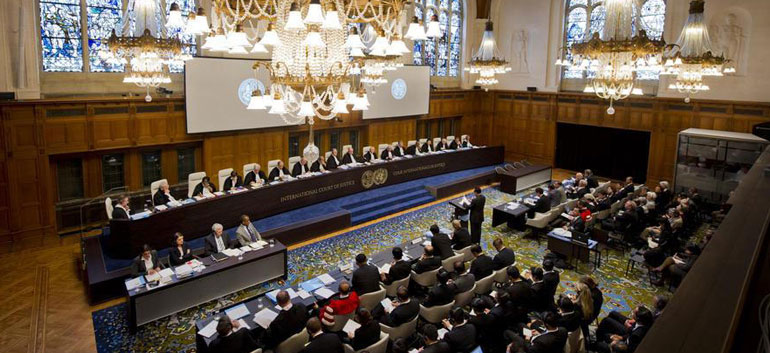The International Court of Justice released a statement Thursday lamenting Colombia’s decision to leave the Pact of Bogota over a ruling granted Colombian waters in the Caribbean to Nicaragua in 2012.
President of the International Court of Justice (ICJ), Peter Tomka, announced his regret at the decision.
MORE: Colombia, Nicaragua presidents meet over Caribbean water dispute
Colombia renounced the 1948 Pact of Bogota, also known as the American Treaty on Pacific Settlement, in protest of a 2012 ICJ ruling granting Nicaragua maritime rights to waters previously belonging to the Colombian state, some of which are thought to include lucrative offshore oil and natural gas reserves.
The Treaty of Bogota was introduced as a general obligation for those countries involved to settle their disputes through peaceful means. It also required them to exhaust regional dispute-settlement practices before bringing claims to the United Nations. Jurisdiction over the treaty fell to the ICJ.
MORE: Colombia denounces Pact of Bogota: President Santos
The ICJ made the decision to award 30,000 square miles of Colombian territorial waters to Nicaragua, isolating the San Andres archipelago in the process and prompting Colombia to leave the Pact of Bogota after repeatedly disavowing the ICJ’s decision.
“The Court notes and regrets the decision of the government of Colombia to withdraw from the pact Bogota. Nevertheless, it will still be called the Pact of Bogota,” explained Tomka, during a talk held in the headquarters of the Organization of American States (OAS) in Washington.
Tomka remained hopeful that Colombia may in the future change its mind.
“Sometimes a state may find out later that to have recourse to the Court is for the benefit of the State. We have seen cases where they have made a statement against the jurisdiction of the Court and the next day they want to use the Court in a dispute with another country,” stated the official.
MORE: Nicaragua files new lawsuit against Colombia to define maritime border
The ICJ President finished the speech by emphasizing that ICJ decisions are “final and binding on the member countries,” not simply a suggestion which countries can choose to adhere to.
The ICJ is one of two major international bodies whose authority President Juan Manuel Santos has skirted during his first term in office. Last month, Santos acted in direct violation of an Inter-American Commission on Human Rights decision ordering dismissed Bogota Mayor Gustavo Petro be allowed to remain in office.
Sources
- Pact of Bogota (OAS)
- Presidente de la CIJ lamenta retiro de Colombia del Pacto de Bogotá (El Tiempo)
- Corte Internacional de Justicia lamentó retiro de Colombia del Pacto de Bogotá (W Radio)
- CIJ lamenta retiro de Colombia del Pacto de Bogotá (Caracol)
- Nicaragua institutes proceedings against Colombia with regard to alleged “violations of Nicaragua’s sovereign rights and maritime zones declared by the Court’s Judgment of 19 November 2012” (International Court of Justice)


